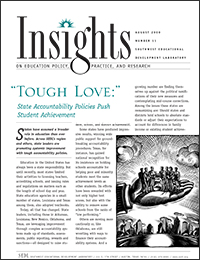References & Credits
References
- Arkansas State Department of Education. (1999, June). Arkansas Comprehensive Testing, Assessment, and Accountability Program, Little Rock, AR: Author.
- Cohen, D.K. (1996). Rewarding teachers for student performance. In S.H. Fuhrman and J.A. O’Day (Eds.), Rewards and Reform: Creating Education Incentives that Work (pp. 60-112). San Francisco: Jossey-Bass Publishers.
- Council of Chief State School Officers. (1999). State Education Accountability Reports and Indicator Reports: Status of Reports Across the States 1999. Washington, DC: Author.
- Dorn, S. (1998, January 2). The political legacy of school accountability systems. Education Policy Analysis Archives, 6, [On-line serial]. Available: http://epaa.asu.edu/epaa/
- Education Week. (2000, January 13). Quality Counts 2000. Author.
- Elmore, R.F., Abelmann, C.H., & Fuhrman, S.H. (1996). The new accountability in state education reform: From process to performance. In H.F. Ladd (Ed.), Holding Schools Accountable (pp. 65-98). Washington, DC: The Brookings Institution.
- Fuhrman, S.H. (1999, January). The new accountability. CPRE Policy Briefs. Philadelphia: University of Pennsylvania.
- Grissmer, D. & Flanagan, A. (1998). Exploring Rapid Achievement Gains in North Carolina and Texas. Washington, DC: National Education Goals Panel.
- Hendrie, C. (1997, September 24). Reconstitution gaining new momentum. Education Week.
- Incentives for School Improvement Act (22-13A-5, NMSA 1978).
- Johnson J. & Duffett, A. (1999). Standards and accountability: Where the public stands. New York: Public Agenda.
- Linn, R.L. (2000). Assessments and accountability, Educational Researcher, 29 (2), 4-16.
- Louisiana State Department of Education. (1999, October 21). Frequently Asked Questions About Out-of-Level Testing. Baton Rouge: Author.
- Louisiana State Department of Education. (Revised May 2000). LEAP for the 21st Century High-Stakes Testing Policy. Baton Rouge: Author.
- Louisiana State Department of Education. (2000, July 1). Louisiana’s IEP Handbook for Students with Disabilities. Baton Rouge: Author.
- National Research Council. (1999). Testing, Teaching, and Learning: A Guide for States and School Districts. R.F. Elmore & R. Rothman (Eds.). Washington, DC: National Academy Press.
- New Mexico State Department of Education. (1999, June). Handbook: Statewide Student Assessment System. Information for Parents, Students, Teachers, and other School Personnel. Santa Fe: Author.
- Olson, Lynn. (1998, February 11). The push for accountability gathers steam. Education Week [On-line]. Available: http:/www.edweek.org/ew/vol-17/22accoun.h17
- Shepard, L., Taylor, G., & Betebenner, D. (1998). Inclusion of limited English-proficient students in Rhode Island’s grade 4 mathematics performance assessment. (Report No. 486). Los Angeles: Center for the Study of Evaluation.
- WestEd. (2000, February). The high stakes of high-stakes testing. Policy Brief. San Francisco: Author.
- White House Initiative on Educational Excellence for Hispanic Americans. (1999). Educational standards, assessment, and accountability: A new civil rights frontier. Washington, DC: Author.
- Whitford, B.L. & Jones, K. (1999). Kentucky lesson: How high-stakes school accountability undermines a performance-based curriculum vision. In B.L. Whitford and K. Jones (Eds.), Accountability, Assessment, and Teacher Commitment: Lessons from Kentucky’s Reform Efforts (pp. 9-24). Albany: State University of New York Press.
Credits
This edition of Insights on Education Policy, Practice, and Research was written by Üllik Rouk, Policy Studies Associates in Washington, DC, and edited by Joyce Pollard, Director of Institutional Communications and program manager for policy information services at SEDL. Julia Guzman, SEDL policy specialist, conducted additional research.
Insights on Education Policy, Practice, and Research may be reproduced and copies distributed to members by educational agencies, organizations, and associations.
This publication is based on work sponsored wholly, or in part, by the Office of Educational Research and Improvement, U.S. Department of Education, under Contract #RJ96006801. The contents of this publication do not necessarily reflect the views of OERI, the Department, or any other agency of the U.S. Government.

